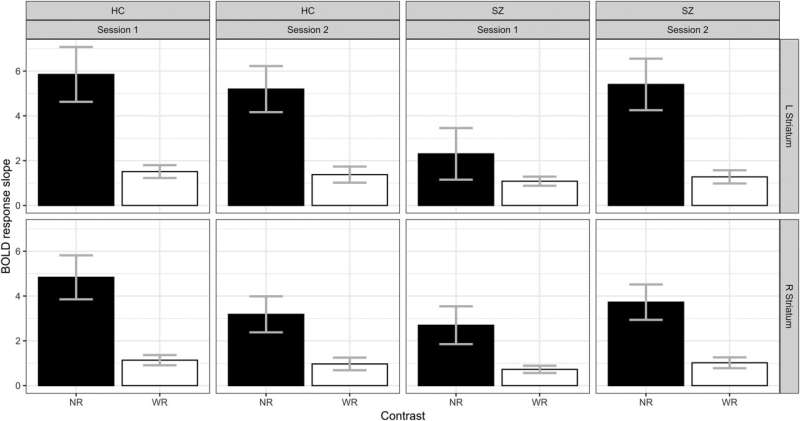This article has been reviewed according to Science X's editorial process and policies. Editors have highlighted the following attributes while ensuring the content's credibility:
fact-checked
peer-reviewed publication
trusted source
proofread
Why schizophrenia and apathy go hand in hand

Schizophrenia, which affects up to 1% of the population, is a neuropsychiatric disorder characterized by multiple symptoms. One of the most common, and for which there is no treatment, is apathy and lack of motivation.
By comparing neural activation between a group of patients and a control group during a reward-based game, a team from the University of Geneva (UNIGE) and the University Hospitals of Geneva (HUG), in collaboration with researchers from Charité Berlin, has deciphered the neural bases of this disorder.
The brains of people suffering from schizophrenia are unable to discriminate between different levels of reward in a sufficiently subtle way, hampering their motivation to undertake everyday tasks.
Published in the journal Brain, these findings suggest several potential treatments, including brain stimulation and targeted psychotherapy.
When discussing schizophrenia, we first think of hallucinatory or delusional symptoms, such as ideas of persecution. Less visible, however, are apathy and lack of motivation, which are just as burdensome in everyday life.
"Lack of motivation is at the root of the difficulties encountered by people suffering from schizophrenia in pursuing their studies, holding down a job, or engaging in social contacts," explains Stefan Kaiser, full professor in the Department of Psychiatry and the Synapsy Center for Neuroscience and Mental Health Research at UNIGE Faculty of Medicine, and Head of the Department of Psychiatry at the HUG, who directed this research.
"Furthermore, the antipsychotics prescribed for hallucinatory phenomena and delusions have no effect on motivation, for which there is currently no effective treatment."
What occurs in the brain, particularly in the neural reward system, the seat of motivation and behavioral response? Using MRI, scientists aimed to ascertain whether individuals with schizophrenia exhibit distinct neural responses compared to those without a mental disorder, and whether these responses correlate with clinical observations.
Triggering neuronal response through a game
The scientists enrolled 152 volunteers—86 people suffering from schizophrenia and 66 "controls" of similar age and gender—to play a reward game in an MRI scanner to observe the activation of their brain regions. The experiment took place in three stages: an assessment of motivation in different contexts, an initial game session and, three months later, a second session identical to the first to measure the stability of the cerebral response over time.
"To stimulate the reward networks, the game allows you to win money—up to around CHF 40. At the start of each session, a circle appears indicating the possible reward: an empty circle (gain 0), a circle with a bar (gain between CHF 0 and 0.4), or a circle with 2 bars (gain between CHF 0 and 2)," explains Mariia Kaliuzhna, a researcher in the Department of Psychiatry at the UNIGE Faculty of Medicine and first author of this research.
"Then three other circles appear. The one on the right or the one on the left differs from the other two; players must press the corresponding button as quickly as possible. Finally, a red bar shows how high the reward was, at which point the neural network is activated. The tests went on like this for around fifteen minutes."
Hypoactivation or saturation
During the first session, individuals with schizophrenia exhibited lower activation levels compared to the "controls," particularly when the reward was low, as if their brains were struggling to activate. On the other hand, during the second session, many of them saw their brain activity increase considerably, even beyond the control group who maintained the same level of activation.
"Despite appearances, these results are not contradictory. They actually indicate that in people with schizophrenia, the neuronal response is unable to adapt to the reward context. There is either hypoactivation or saturation, indicating a failure to regulate this brain structure.
"In both cases, the person cannot correctly evaluate the reward to adapt their behavior. The result is an inability to respond to small everyday gratifications, such as a meal with friends or a pleasant walk, typical of apathetic behavior," explains Kaliuzhna.
These results open a number of therapeutic avenues that would precisely target this neuronal activation defect. "For example, psychotherapy targeting the perception of reward and pleasure to reinforce motivation to engage in social behavior, or the use of non-invasive brain stimulation, a technique already used to treat depression," explains Kaliuzhna.
"However, these techniques are complex and need to be validated in clinical trials before any clinical implementation."
More information: Mariia Kaliuzhna et al, Adaptive coding of reward in schizophrenia, its change over time and relationship to apathy, Brain (2024). DOI: 10.1093/brain/awae112




















